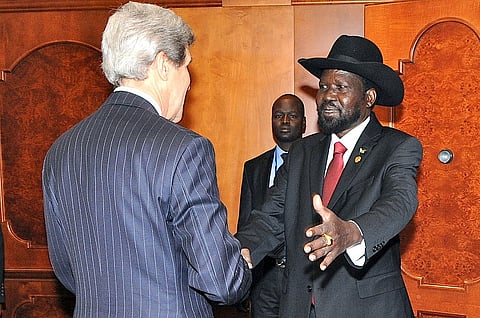

South Sudan, the world’s youngest nation, is once again on the precipice of renewed conflict and political instability. On March 4, a Nuer militia aligned with Riek Machar, the former rebel leader and current first vice president, seized an army base in Nasir, a strategic town near the South Sudan-Ethiopia border. Machar has accused the South Sudanese army, loyal to President Salva Kiir, of attacking his forces in Ulang County on February 25, as well as targeting his supporters in other western regions. The escalating tensions have pushed the fragile unity government, formed under a 2018 peace agreement that ended a devastating five-year civil war, to the brink of collapse.
The 2018 peace deal, which brought an uneasy calm to South Sudan, is now under severe strain. President Kiir has responded to the Nasir incident by arresting several of Machar’s top allies, further inflaming tensions in the capital, Juba. Since Tuesday, soldiers from the South Sudanese army have reportedly surrounded Machar’s residence in Juba, according to members of his party, the Sudan People’s Liberation Movement in Opposition (SPLM/IO). Kiir leads the ruling Sudan People’s Liberation Movement (SPLM), the faction from which Machar’s group splintered.
The roots of the current crisis trace back to 2013, when a political rift between Kiir and Machar erupted into a full-scale civil war. The conflict, which lasted five years, displaced over a million people and claimed more than 400,000 lives. Although the 2018 Revitalised Agreement on Resolution of the Conflict in South Sudan (R-ARCSS) brought a temporary halt to the fighting, the underlying tensions between the two leaders have never been fully resolved. Recent violence in Upper Nile state, reportedly sparked by rumors of forced disarmament of local groups, has further destabilized the fragile peace.
The situation in South Sudan is further complicated by the ongoing civil war in neighboring Sudan, which has placed immense pressure on Kiir’s government. Since April 2023, Sudan has been engulfed in a brutal conflict between the Sudanese military, led by General Abdel Fattah al-Burhan, and the paramilitary Rapid Support Forces (RSF), commanded by General Mohammed Hamdan Dagalo, known as “Hemedti.” This conflict has had dire consequences for South Sudan. In 2024, South Sudan lost two-thirds of its state revenues after its main oil export pipeline, which runs near Khartoum, was damaged during fighting. Repairs have been stalled, and oil exports remain halted, plunging the country into a severe fiscal crisis.
The economic fallout has deprived Kiir’s government of the funds needed to maintain its patronage networks, weakening its ability to stabilize the regime. Widespread discontent is growing, and the risk of prolonged proxy fighting in South Sudan, fueled by the Sudanese conflict, looms large. Analysts warn that without urgent intervention, the situation could spiral into a broader regional crisis.
South Sudan’s independence in 2011 was marked by hope, but the country’s political landscape has been marred by ethnic divisions and power struggles. The dominance of the Dinka ethnic group, to which Kiir belongs, has historically fueled animosity with other groups, particularly the Nuer, Machar’s ethnic group. These divisions came to a head in 2013 when Kiir dismissed Machar as vice president, accusing him of plotting a coup. Machar, in turn, denounced Kiir as a dictator and formed the SPLM/IO, sparking a civil war that devastated the nation.
Despite its vast oil reserves, South Sudan remains one of the poorest countries in the world, with a population of 11 million grappling with widespread poverty and a humanitarian crisis. The 2018 peace agreement, though imperfect, offered a glimmer of hope. However, the recent escalation of violence and political tensions threatens to undo even these fragile gains.
African leaders with influence, particularly from Kenya, Ethiopia, and South Africa, are being urged to intervene before the situation deteriorates further. The international community is closely watching as South Sudan, still reeling from the scars of its past, faces the prospect of another devastating conflict. Without swift and decisive action, the country risks sliding back into the chaos that has defined much of its short history.